Code Plagiarism Roshomon: The Controversy Between zkSync and Polygon is Escalating into a Debate on "Open Source Spirit"
Written by: Loopy Lu, OdailyNews
Today, a war of words over plagiarism erupted between two "L2 giants," attracting the attention of many onlookers.
Polygon Zero stated on Twitter that Matter Labs, the developer of zkSync, copied some of Polygon's open-source code without acknowledgment. zkSync, on the other hand, claimed that only 5% came from Polygon Zero and that they provided a citation, criticizing the other party for lacking an open-source spirit.
Currently, this incident is still unfolding, and just now, a third party has joined the fray. Manta Network accused that the so-called "plagiarized" code was originally created by a Manta employee.
Boojum Plagiarizing Plonky 2?
For zk rollups, zero-knowledge proof systems are crucial and quite challenging. This part of development tests the R&D capabilities of various companies. Polygon's Polygon Zero has developed its own zero-knowledge proof system, Plonky 2, and Starky.
In the development team's own introduction, Plonky 2 is described as "the fastest solution currently available," "100 times faster than existing alternatives," and compatible with Ethereum. It combines the advantages of PLONK and FRI, offering fast proofs and a trustless setup; it also incorporates the benefits of SNARKs, supporting recursion and low verification costs on Ethereum.
This system was officially released to the public in January 2022 and was open-sourced in August of the same year.
In July of this year, zkSync also launched its own proof system. This proof system, named Boojum, boasts many features and also claims "world-class proof performance" with lower hardware requirements. zkSync stated that Boojum can run on consumer-grade GPUs, requiring only 16 GB of GPU RAM.
Interestingly, last night, a blog post from Polygon Zero emerged, vehemently accusing the Boojum system of plagiarism.
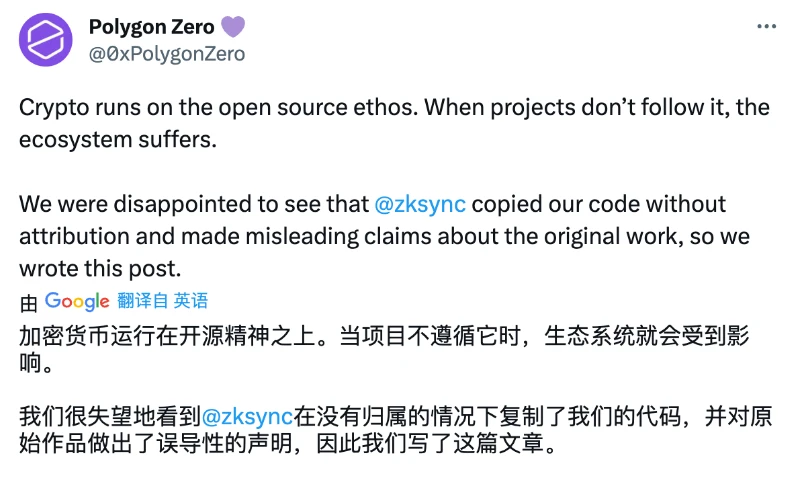
Specifically, Polygon Zero accused zkSync of directly copying their open-source code without properly citing the source according to copyright declarations.
It should be clarified that although many projects open-source their code, this does not mean that third parties can freely use this open-source code. Open-source projects will always include copyright declarations when they open-source their code. Plonky 2 uses the Apache License V2 and MIT license as its open-source agreements.
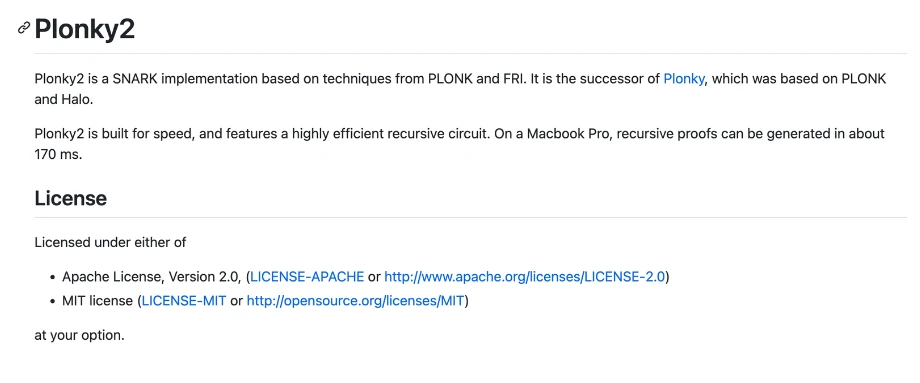
If third parties wish to utilize this code, they must adhere to the specifications of the copyright agreements.
Specifically regarding this dispute, the Apache open-source license stipulates that derivative code modified from code that complies with this agreement must include the original author's copyright declaration and other notes. The MIT license also requires the inclusion of the original author's information.
So did zkSync actually use Plonky 2's code? The evidence provided by Polygon is as follows.
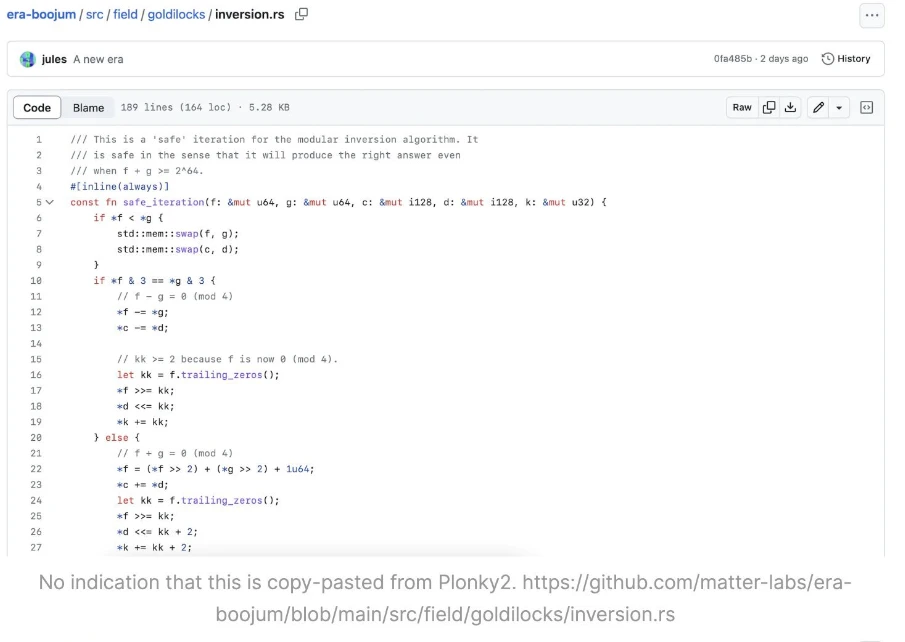
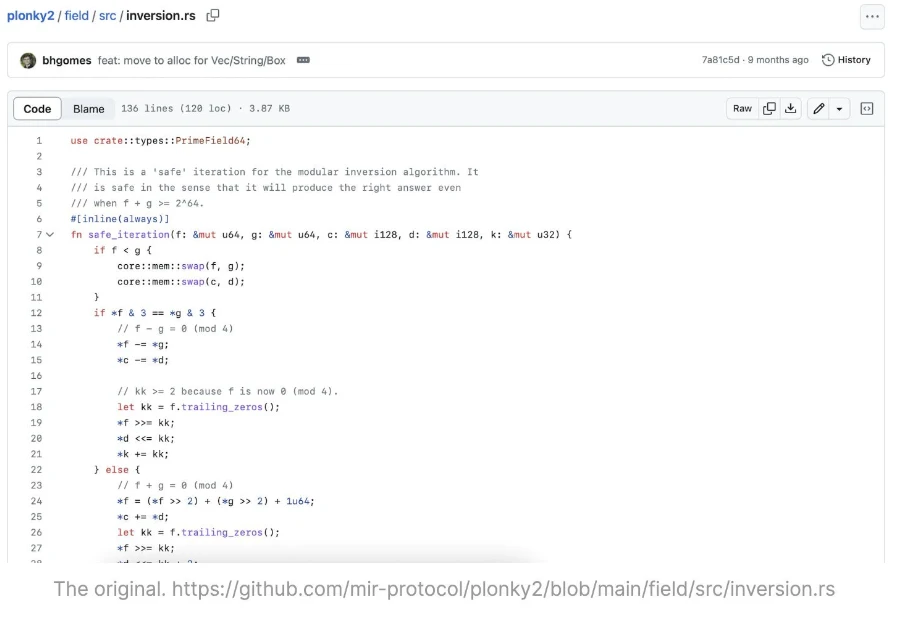
There is no doubt that these two pieces of code are identical. This substantiates Polygon's accusations.
In addition to the blatant code copying, Polygon also accused zkSync of plagiarizing (or perhaps borrowing?) its overall design philosophy. Polygon believes that Boojum is very similar to Plonky 2. They both use the same parallel repetition strategy to enhance soundness in small fields and employ similar custom gates for efficient arithmetic recursion verification. Furthermore, zkSync's Poseidon's MDS matrix and parameters are also the same as those discovered by the Polygon Zero team.
Polygon also accused Matter Labs of exaggerating the capabilities of Boojum. In Boojum's introduction, this system claims to be 10 times faster than Plonky 2. Polygon sarcastically remarked, "I wonder how this is achieved, as the key performance parts of Boojum's code were directly copied from Plonky 2."
Who is Violating the Spirit of Open Source?
Matter Labs has now responded to this incident. Its CEO, Alex Gluchowski, posted a lengthy tweet to explain the plagiarism incident in detail.
Regarding the accusation of direct copying, only 5% of Boojum's code is based on Plonky 2, and it was not without copyright declaration; they provided a clear indication in the first line of the module's main file.

Boojum code
In the Readme file, they also indicated information about Plonky 2.

Boojum's readme file
Gluchowski stated, "The first line of our module prominently reflects Plonky 2. What could be more prominent than the first line?"
As for the technical plagiarism, Gluchowski explained that Boojum and Plonky 2 are both implemented using Redshift. RedShift was introduced by Matter Labs three years before the release of the Plonky 2 paper.
Regarding performance, they stated that their performance parameters were based on neutral third-party benchmarks. Performance was tested using SHA 256, and the results were completely neutral.
This war of words over whether plagiarism occurred has escalated to a higher level. Both sides have wielded the stick of values to accuse each other, with Gluchowski stating that he "fully agrees" with Polygon Zero's team's support for open source—"sustainably building software openly benefits everyone."
He stated that open source means genuine collaboration. Polygon's actions are certainly not in the spirit of the open-source movement. "If you don't want others to use parts of your code, maybe open source isn't for you?"
The Climax of the Farce: Both Sides are Plagiarizing?
In the battle for Ethereum scalability, zkEVM is referred to as the holy grail of scaling. zkEVM has a crucial impact on developers' contract deployment experiences, and since Ethereum's initial design did not consider ZK-friendliness, this means that zero-knowledge proofs require substantial resources for computation.
Currently, the entire zkEVM market is still in its early stages. Developing EVM-compatible ZK Rollups is highly challenging, making this field a competitive race among industry players.
Earlier this year, Polygon's Mihailo Bjelic and Matter Labs' Alex Gluchowski had intense exchanges over some technical issues related to zkSync. This has, to some extent, led both Polygon and Matter Labs to rush to launch the first scalable zkEVM. This may also be an inducement for this plagiarism controversy.
As the incident continues to unfold, the war of words has intensified, with both sides sticking to their claims.
Another competitor in the ZK-Rollup space, Starkware, has expressed interest in the situation, with co-founder Uri Kolodny stating that this is not the first instance of code plagiarism. "I bet an ice cream that it won't be the last time."
Starkware's ecosystem head, Louis Guthmann, added, "The accusations from (Polygon Zero) are serious. More importantly, honest and clear code attribution is the essence of open source."
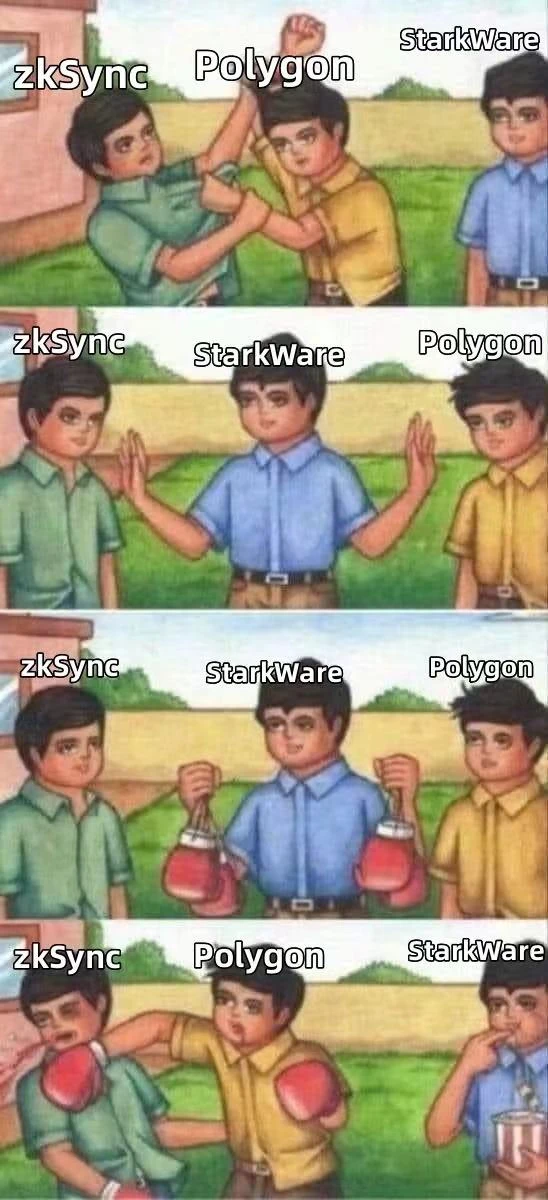
While both sides maintain their positions, third-party forces have also entered the battlefield.
Just now, Manta Network's Chinese community tweeted that Polygon Labs claimed zkSync used their code without acknowledgment, but in fact, this code was originally created by Brandon from Manta Network. This has further heightened the attention surrounding the incident.










